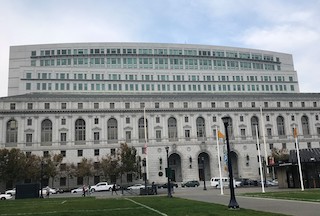In 1994, in Stanislaus County Superior Court, a jury convicted Brian David Johnsen of first-degree murder (Penal Code § 187), attempted murder (Penal Code §§ 664, 187), two counts of robbery (Penal Code § 212.5), three counts of burglary (Penal Code § 459) and five counts of solicitation to commit murder (Penal Code § 653f). The attempted murder was of an elderly couple while they were asleep.
In a Nutshell: A motion for change of venue under Penal Code § 1033 must show it is more probable than not that defendant cannot receive a fair trial if trial remains in a particular courthouse. The following summary is a good primer of what needs to be shown and argued, as well as asked of potential jurors.
At the close of the penalty phase, the jury returned a verdict of death. Johnsen moved for a new trial and to modify his sentence to life without the possibility of parole. The trial court denied these motions and sentenced Johnsen to death. His appeal was automatic.
On appeal to the California Supreme Court in 2019, the court was faced with many appellate issues, but his article will only focus on Johnsen’s argument that the judge erred in denying his motion for a change of venue, as we have people who often call us asking about a change in venue.
According to Johnsen, the county’s media outlets engaged in “inflammatory coverage” that publicized inadmissible evidence and erroneously reported that Johnsen had “attempted to manipulate the system and delay the trial, thereby costing the county thousands of dollars.” He contends the judge’s denial of the motion deprived him of a fair trial in violation of the Sixth Amendment to the federal Constitution.
Before trial, in November 1993, Johnsen moved for a change of venue under Penal Code § 1033 In support of his motion, Johnsen compiled about 20 news articles pertaining to the case and attached a survey report by Dr Stephen J. Schoenthaler, a criminal justice professor at California State University, Stanislaus, which concluded that Johnsen could not have a fair trial in Stanislaus County.
 California Supreme Court San Francisco
California Supreme Court San Francisco
The survey include analysis that 239 phone calls were made to Stanislaus County residents and 70 percent had heard of the case and 41 percent believed Johnsen was guilty. Sixty percent believed Johnsen, if convicted, should get the death penalty.
The district attorney opposed the motion, arguing that professor Schoenthaler’s survey did not even ask interviewees the crucial question: whether they would be willing to set aside their preexisting views and decide the case based on evidence introduce at trial. The district attorney also noted that all 35 relevant newscasts aired in March 1992 in the weeks after the murder and at the time of Johnsen’s arrest were nearly two years before trial began in February 1994.
The trial court held a four-day hearing on the motion. The prosecutor used an expert who had testified 25 times for the prosecution in opposing change of venue motions. The expert said such studies, as those like the one by Professor Schoenthaler, are meaningless because the survey participants are not representative of those people who would show up for jury duty. He also noted that Schoenthaler’s results indicated 44.1 percent of all survey subjects did not have any knowledge of the case.
The judge denied the motion, finding that while the nature and the gravity of Johnsen’s offense supported a venue change, but all the other legally relevant factors weighed in the opposite direction. In sum, he found under People v. Smith (2015) 61 Cal.4th 18, 39, that there was not a “reasonable likelihood” that Johnsen could not receive a fair and impartial trial in Stanislaus County. In response, Johnsen sought a writ of mandate in the Court of Appeal, which denied the writ.
Following the verdicts and the death sentence, Johnsen’s appeal renewed the change of venue argument. The California Supreme Court affirmed the trial court’s ruling on this issue, noting that “reasonable likelihood” “means something less than ‘more probable than not’ and “some more than merely possible.” The court also considered the nature and extent of the media coverage, the size of the community and the community status of the defendant and the victim.
We bring this short summary to the reader’s attention because it discusses specific facts such as the number of news articles and how large a change of venue survey was, as well as what questions were asked and not asked, that can be compared to one’s situation.
The citation for the California Supreme Court ruling discussed above is People v. Brian David Johnsen (2021) 10 Cal. 5th 1116, 274 Cal. Rptr. 3d 599, 480 P. 3d 2.
For more information about change of venue, please click on the following articles:
 California Supreme Court San Francisco
California Supreme Court San Francisco